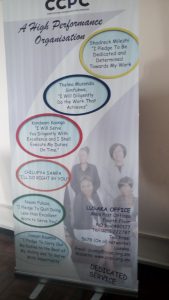By Tobias Mulimbika, Director of Industry, Ministry of Commerce, Trade and Industry (MCTI) Zambia
According to the HPO Center the HPO Framework developed by Dr. André de Waal has been validated in many sectors, including the governmental sector. During these validations, the HPO Center has noticed that governmental institutions often look rather reservedly at the framework as they feel that in a political environment it is not easy to become and stay high performing. Fortunately the Government of Zambia, through the Ministry of Commerce, Trade and Industry, believes that the HPO framework is an important technique to achieving high performance status in its institutions. Therefore since December – when the HPO Center performed the first ever HPO Diagnosis in Zambia for the Ministry of Commerce, Trade and Industry – the HPO Center has been invited to conducted three more diagnoses: for the Zambian Weight & Measurement Agency (ZWMA), Competition and Consumer Protection Commission (CCPC), and Patents and Company Registration Agency (PACRA). With a view of introducing the HPO principles in the public sector the Zambian government has not looked back since!
This whole process started with a meeting with Dr. Msiska, the Secretary to the Cabinet in Zambia. In November and December the HPO Questionnaire was distributed, via the internet, to all managers and employees of MCTI and the four statutory bodies under MCTI. In total 171 (out of 404 possible respondents) completed questionnaires were received which constituted a response rate of 42.3 percent. The HPO Center analyzed this data using a Confirmatory Factor Analysis (CFA), in order to evaluate whether the factors of the HPO Framework were applicable for MCTI. Subsequently, I myself organised a workshop, conducted by Dr André de Waal, in Lusaka with representatives of all departments of MCTI and the four statutory bodies. During the workshop I was convinced that HPO framework was an extremely useful technique for achieving high performance status in government institutions.
Sharing the HPO-results
After the workshop I immediately arranged for an appointment with the Secretary to the Cabinet to share the results of the Ministry’s HPO diagnosis with him. Subsequently the Secretary to the Cabinet called for a team of four permanent secretaries from the Management Development Division (Cabinet Office), Public Service Management Division (Cabinet Office), and the Ministry of Labour and Social Security to join us for the meeting. In the picture below the author is making a presentation to the Secretary to the Cabinet and his team at Cabinet Office.
 Dr. Msiska’s first reaction of the HPO framework was “this a very useful tool that government must use to improve performance of the public service”. He went on to ask the permanent secretaries present in the meeting what their first impressions of the framework were. Everybody agreed they where equally impressed with the framework. I recall Dr. Velepi Mtonga, Permanent Secretary of the Management Division, saying “this tool is very useful in bringing out areas which policy makers need to pay particular attention for public institutions to become and stay high performing”. This was the start of journey of the road to the application of HPO framework in the public sector in Zambia.
Dr. Msiska’s first reaction of the HPO framework was “this a very useful tool that government must use to improve performance of the public service”. He went on to ask the permanent secretaries present in the meeting what their first impressions of the framework were. Everybody agreed they where equally impressed with the framework. I recall Dr. Velepi Mtonga, Permanent Secretary of the Management Division, saying “this tool is very useful in bringing out areas which policy makers need to pay particular attention for public institutions to become and stay high performing”. This was the start of journey of the road to the application of HPO framework in the public sector in Zambia.
After the presentation Dr. Msisika decided to meet with Dr. André de Waal to discuss the possibility of applying the framework in the public sector. He said “this is a very good framework for enhancing performance in the public sector. I want to meet Dr André de Waal and see if his framework can be introduced in the public service as a pilot project”. Immediately I was instructed to make arrangements to ensure that Dr. André de Waal would meet with the Secretary to the Cabinet. Fortunately, after the first diagnosis one of the statutory agency (Zambia Weights and Measures), under the Ministry of Commerce, made up their mind to invite Dr. André de Waal to conducted a specific HPO diagnostic for their institution in Arpil. Therefore, it was ease for me to arrange an appointment for the Doctor to meet the the Secretary to Cabinet. The result of this meeting was further instructions from the Secretary for me to work with Ms. Siame Kayula, the coordinator of the Public Service Reforms Development Programme (PSRDP) to prepare a project proposal to secure resources to introduce the HPO framework in the public sector in Zambia. A project proposal and request for consultancy to conduct HPO diagnostic workshops for CCPC and PACRA as pilot projects for introducing the HPO principles in the public sector was sent to the HPO Center.
HPO Workshops
So in December the year after, Dr André came for two weeks to Zambia to conduct the diagnostic workshops. The workshops were preceded by an HPO information session for people from other government departments and institutions, interested in the HPO Framework; and I became the “HPO Champion” for the government of Zambia. As an HPO Champion I organised and coordinated the HPO diagnoses. I also took this work on as part of my DBA (doctor of business administration) work at the Maastricht School of Management (with Dr. André as my supervisor). To make my work easier working with Chief Executives of the pilot Institutions, I identified focal point persons (i.e. HPO Champions and HPO Coaches) as the coordinators and pioneers of this programme at each of the participating institutions.
In April the HPO Center conducted HPO training workshops for the HPO coaches from (ZWMA, CCPC and PACRA. The main objective of the workshops was to provide in-depth training to the HPO coaches and HPO Champions on the HPO responsibilities so that they could begin performing their HPO coaching work with their colleagues and managers. During the workshops facilitated by Dr André, the HPO Coaches together with the Champions developed HPO action plans for the statutory bodies to be implemented. These HPO action plans highlighted the institutions’ HPO visions and activities to be undertaken during the period of the plans. Further, the action plans would be used as a tool for monitoring and evaluating the application of the HPO Framework in the public institutions in Zambia.
As part of my monitoring activity, I caught up with the HPO champions and Coaches from the three institutions. The meeting was initially called for HPO champions only but it was later decided that since the HPO Coaches were also having a networking session at CCPC office, it would be prudent to join in. The networking session was one of the activities in the action plan for CCPC. The purpose of this activity was to share experiences and learn from each other. See the picture below showing the HPO Networking session. Far left is HPO Champion Andrine from ZWMA, and HPO Champion Beene from CCPC is second on the same side.
The meeting was initially called for HPO champions only but it was later decided that since the HPO Coaches were also having a networking session at CCPC office, it would be prudent to join in. The networking session was one of the activities in the action plan for CCPC. The purpose of this activity was to share experiences and learn from each other. See the picture below showing the HPO Networking session. Far left is HPO Champion Andrine from ZWMA, and HPO Champion Beene from CCPC is second on the same side.
HPO Coaches share their experience
After an introduction by myself, the HPO Coaches took turns to share their experiences on how the implementation of the HPO activities were proceeding in their institutions. The converging point for the sharing of experiences was how each institution was resolving the attention points that were identified by Dr. André during the HPO diagnostics workshops. One of these priority attention points for PACRA was “How can we use all the intellect in the institution”. To address this attention PACRA has put in place a project team comprising of five members of staff who have prepared a behavioral change plan. The behavioral change plan focus on changing the mindset of the employees. Activities, among others, that are being implemented by PACRA include fitness days, every first and last Friday of the month has been declared as an HPO day, an HPO dress code, recognition of employee of the month, and creation of a CEO day. The CEO day is a platform were employees are free to come up with ideas on how to improve the performance of the institution, after which management uses these ideas to address some the challenges of the institution.
For ZWMA, one of the priority attention is “How to get rid of the disconnect between management and employees”. To address this attention point the institution has put various activities in place which mainly focus on improving communication between management and employees.. The institution also embarked on leadership and mindset training for key employees; created more transparency during institutional budget preparations; and developed various institutional policies such as Human Resources Development and HIV/AIDS policies. In additional they have also agreed on an HPO dress code.
How can we make it possible for our employees to perform better
Priority number one for the attention for CCPC is “How can we make it possible for our employees to perform better”. In order to address this attention point, the institution has put in place a project team to address the quick and long terms “wins”. The first assignment of the project team was to conduct one-to-one interviews with employees to identify ideas which could provide immediate and long term solutions to improve the flow of information in CCPC and reduce red tape in the institution. The progress of the project team is evaluated every three weeks. Some of the activities that the project team has by now implemented included the creation of a HPO WhatsApp group; an HPO day every month (where employees wear HPO branded shirts and T-Shirts); regular HPO Skype Call for conference call with HPO coaches outside Lusaka, and HPO employees’ pledges which have been put on pop-up and distributed across offices in the country. A sample of these pledges by CCPCs employees is shown below. It is interesting to note the pledge by CEO Chilufya Sampa which reads “I Will do right by you”. This is a very good and effective strategy that will help the CEO push his team members so they can surpass his and their own expectations. Obviously, high-performing employees will reflect very well on each CEO.
Furthermore the institutions also discussed the challenges that they are facing in regard to the application of the HPO principles in their institutions. Common among them was the challenge of “resistance to change among the employees and some management staff and the impact of the public service culture”. It was noted these two factors were affecting the rate at which the HPO framework is being absorbed in all the institutions. Therefore, all institutions have come up with a behavioral change activities to ensure that there was a broader understanding for the need of creating high performance environment at work places. At the same time the institutions appreciated that the HPO framework has offered them a mechanism for overcoming the deficiencies of traditional bureaucratic communication and also provided them with an alternative performance management framework which is suited for effective communication between management and employees, and between the institutions and its clients, the civilians and companies of Zambia. All the institutions reported improvements in communications between employees and managers, and it was also already noticed that clients were speaking with more respect about the institutions and were more happy with the service they receive. These hopeful results which have been achieved in a relatively short times pan is a great incentive for all institutions to go full steam ahead with HPO.
For more information about the HPO Framework, HPO Diagnosis, our lecturers, HPO Experts, workshops and Master Classes, please contact us (schreurs@hpocenter.com).


